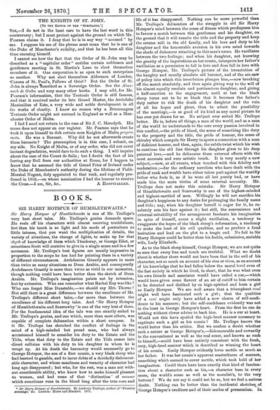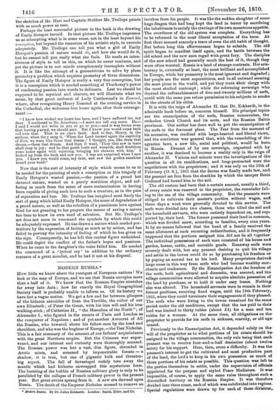BOOKS.
SIR HARRY HOTSPUR OF H1JMBLE'rliWAITE.* .Sir Harry Hotspur of Humblethwaite is one of Mr. Trollope's -very best short tales. Mr. Trollope's genius demands space. Ile reels off his characters with almost unerring truthfulness, but then his touch is so light and his mode of portraiture so 'little intense, that you want the multiplication of details, the variety of situations, the change of lights, to make up for that .depth of knowledge of them which Thackeray, or George Eliot, or "sometimes Scott will contrive to give in a single scene and in a few aentences. Mr. Trollope's best figures are usually impressive in proportion to the scope he has had for painting them in a variety of different circumstances. Archdeacon Grantly appears in more than twice as many situations as Dean Arabia, and consequently Archdeacon Grantly is more than twice as vivid in our memories, -though nothing could have been better than the sketch of Dean Arabin. Mr. Trollope's imagination paints not by intension, but by extension. Who can remember what Rachel Ray was like ? Who can forget Miss Dunstable,—we should say Mrs. Thorne ? But still there is a great difference between the excellence of Mr. "Trollope's different short tales,—far more than between the 'excellence of his different long tales. And 'Sir Harry Hotspur -of Humblethwaite and Scarrowby ' is one of the very best of them. For the fundamental idea of the tale was one exactly suited to Mr. Trollope's genius, and one which, more than most others, was -capable of complete delineation within a short compass. In it Mr. Trollope has sketched the conflict of feelings in the mind of a high-minded but proud man, who had always -accustomed himself to consider his duty to the Estate and the Title, when that duty to the Estate and the Title comes into 'direct collision with his duty to his daughter in whom he is wrapt up. At his death the baronetcy would necessarily go to -George Hotspur, the son of a first cousin, a very black sheep who bad learned to gamble, and to incur debts of a decidedly dishonour- -able character, and whose manliness and veracity of character had lone ago disappeared ; but who, for the rest, was a man not with- out considerable ability, who knew how to make himself pleasant to women, and had some of that ' distinction ' of manner which sometimes runs in the blood long after the true core and
Sr Harry Hotspur of Humblethwaite. By Anthony Trollope, author of "Framley arsonage," Ac. London: Hurst and Blacken. 1871.
life of it has disappeared. Nothing can be more powerful than Mr. Trollope's delineation of the struggle in old Sir Harry Hotspur's mind between the sense of fitness which predisposes him to favour a match between this gentleman and his daughter, on the ground that it will reunite the title and the property and keep the estates still in the old family, and his love and duty to his daughter and the honourable aversion in his own mind towards the shade of dishonour attaching to this man's name. He vacillates between the two feelings ; and when his daughter, not knowing the gravity of the imputations on her cousin, interprets her father's vacillation as a permission to fall in love and does fall in love with George Hotspur, Mr. Trollope's picture of the irresolution of the haughty and usually absolute old baronet, and of the see-saw of policy into which this irresolution plunges him,—now breaking off the match absolutely, and then again giving way to the will of his almost equally resolute and pertinacious daughter, and giving a half-sanction to the engagement, until at last the black sheep turns out to be so black that it becomes the father's duty rather to risk the death of his daughter and the ruin of all his hopes and plans, than to admit the possibility of the marriage,—is as good of its kind as any moral picture he has ever yet drawn for us. No subject ever suited Mr. Trollope better.. He is, before all things, a man of the world, and as a man of the world he understands to the core every passion involved in this conflict,—the pride of blood, the sense of something like duty to the property and the title, the pride of honour, the sense of chivalry which compels Sir Harry to spurn a connection with a man of deficient honour, and then, again, the subtle twist which his wish to continue the old line through his daughter gives to his deep paternal love,—and he delineates these external effects with the most accurate and sure artistic touch. It is very nearly a new subject,—new, at all events, when touched with this fidelity and moderation ;—for the ordinary novelists who have dealt with the pride of rank and wealth have either taken part against the worldly father who feels it, as if he were all but purely bad, or have made him the mere victim of some external necessity. Mr. Trollope does not make this mistake. Sir Harry Hotspur of liumblethwaite and Scarrowby is one of the highest-minded and highest-mettled of men. Willingly he will not sacrifice his daughter's happiness to any desire for prolonging the family name and title ; nay, when his daughter herself is eager for it, he re- solutely sets his face against it ; but still, the convenience and external suitability of the arrangement fascinate his imagination in spite of himself, cause a slight vacillation, a tendency to exaggerate the hopes of the black sheep's reformation, a tendency to make the least of his evil qualities, and so produce a fatal hesitation and lead on the plot to a tragic end. No foil to Sir Harry Hotspur could be better than his feeble, submissive, amiable wife, Lady Elizabeth.
As to the black sheep himself, George Hotspur, we are not quite so sure that every line and touch are truthful. What we doubt about is whether there would not have been that in the evil of his character, not so much on account of his sins or vices, as on account of his knowledge that he had fallen below the moral level even of the fast society in which he lived, in short, that he was what even his own friends and associates would have called a cur,—which would have given some flavour of an air of caitiff to him certain to be detected and disliked by so high-spirited and keen a girl as Emily Hotspur. We are well aware that a triumphant roue might well have fascinated such a girl ; that the qualities of a roue' might only have added a new charm of self-confi- dence to his manners ; but the self-confidence evidently was not in the least in George Hotspur's heart. From the first he can do nothing without clever advice to back him. He is a cur at heart. Would not this have spoiled the high-bred manner necessary to captivate such a girl as his cousin ? Mr. Trollope knows the world better than his critics. But we confess a doubt whether such a nature as George Hotspur's,—dishonourable and cowardly in the conventional as well as the real sense, and known as such to himself,—could have been entirely consistent with the fresh, easy, high-bred manner which is described as winning the heart of his cousin. Emily Hotspur evidently loves mettle as much as her father. It was her cousin's apparent masterlineas of manner, something which seemed to cover mettle, which took hold of her imagination. Could there have been exactly that kind of fascina- tion about a character such as his,—a character base in every sense, the world's sense as well as the moralist's, to the very bottom? We do not say it could not be so, but we feel a Betio= doubt. Nothing can be better than the incidental sketchet of George Hotspur's creditors and of their modes of persecution. In
the sketches of Mr. hart and Captain Stubber Mr. Trollope paints with as much power as ease.
Perhaps the least successful picture in the book is the drawing of Emily Hotspur. herself. In that picture Mr. Trollope impresses us as attempting what is in some sense, not in the least beyond his conception, but beyond the resources of his artistic style, to execute adequately. Mr. Trollope can tell you what a girl of Emily Hotspur's passion of nature would do, and how she would do it, but he cannot tell you really what she feels. He needs an inten- siveness of style to tell us this, on which he never ventures, and yet the picture is to our minds conspicuously incomplete without it. It is like the attempt of a geometrician to solve by plane geometry a problem which requires geometry of three dimensions. The figure of Emily Hotspur is really a very fine conception, but it is a conception which it needed something of Thackeray's power of condensing passion into words to delineate. Lest we should be supposed to be mystical and obscure, we will illustrate what we mean, by that great outburst of Lady Castlewood's in Esmond, where, after recognizing Henry Esmond at the evening service in the Cathedral, she welcomes him home again after their estrange- ment:
" I know how wicked my heart has been, and I have suffered too, my dear. I confessed to Mr. Atterbury.—I must not tell any more. He— I said I would not write to you or go to you,—and it was better oven that, having parted, we should part. But I knew you would come back —I own that. That is no one's fault. And to-day, Henry, in the anthem, when the y sang it, 'When the Lord turned again the captivity of Zion, we were like them that dream ;' I thought, yes, like them that dream,—them that dream. And then it went, They that sow in tears shall reap in joy ; and he that goeth forth and weepeth, shall doubtless come home again with rejoicing, bringing his sheaves with him.' I looked up from the book and saw you. I was not surprised when I saw you. I knew you would come, my dear, and saw the golden sunshine round your head."
Now that is the sort of intensity of style which seems to us to be needed for the painting of such a conception as this tragedy of Emily Hotspur's wasted passion,—the passion of a proud but devoted nature, wasted on a purely worthless object, and suf- fering as much from the sense of mere contamination in having been capable of giving such love to such a creature, as in the pain of separation and loss. Mr. Trollope has imagined most finely the sort of pang which killed Emily Hotspur, the sense of degradation of a proud nature, as well as the rebellion of a passionate love against God for not granting to her prayers the means of saving a nature too base to know its own need of salvation. But Mr. Trollope's art does not seem to command the symbols by which this could be adequately expressed. He has drawn a nature which needed por- traiture by the expression of feeling as much as by action, and has failed to portray the intensity of feeling of which he has given us the sign. Consequently, he has left this central figure unfinished.
He could depict the conflict of the father's hopes and passions. When he came to the daughter's the voice failed him. He needed the command of a 'lyrical cry' in addition to the ordinary resource of a great novelist, and he had it not at his disposal.



































 Previous page
Previous page